#inspiring people with my work is literally why i chose to pursue art/animation as a career path
Explore tagged Tumblr posts
Note
Hello! I absolutely love love LOVE your RvB au art! Your designs and choices for the characters are so good and it gets me so inspired! I also wanted to say that I’m going to be participating in an exchange where people make fic inspired by existing mcyt works such as art and I was wondering if you are okay with people making fic/art/web weaves/other fanworks based on your art. If there's anything else you'd like to know, or any specifications you'd have if someone did this, Id be happy to clarify things! Have a great day!
hearing this literally makes my day, rvb au is something that brings me so much joy because it's a merging of two of my favourite pieces of media. it was honestly something that i didn't think would gain much traction (rvb being literally as old as i am) and while i was okay with that because it made me happy, it's been such a pleasant surprise to see that other people are enjoying it and being inspired by it!
i am MORE than okay with people creating art/fic/etc for or inspired by this au, and while i'd like to be given credit (especially if it's based directly off this au), i would love to be tagged in/mentioned in/sent whatever content is made so i can see it!!! people being inspired enough by what i make to create their own content brings me indescribable amounts of joy and i am so grateful to everyone who does.
and for you or anyone else who wants to make content for this au, or who simply likes it, and has questions about things i haven't shown or revealed yet such as specific character claims, dynamics, or general information, please feel free to ask because i would be happy to share! (i could ramble about this au for hours if given the chance)
#notart#rvb/hc au#:D#answer#kyleknight#this applies to all my aus and stuff rlly#inspiring people with my work is literally why i chose to pursue art/animation as a career path#it is always such an honour and a gift to see people connect with what i make in such a way#pestposting
4 notes
·
View notes
Text
The legend Of Korra : Book 02-Philosophy Everywhere
I'm going to divide this one into two parts, talking about the episodes before the episodes 07 and 08 and after them. Due to this first half, I consider the 02 book the weakest of all and here are some of the why.
Beginning 6 months after the events of Book 01, after all that dark shit that happened, everything is great. Right away we had a significant change that was the change with respect to animation, previously made by Studio Mir and that in book 2 began to be made by the studios Pierrot. Nothing against the work of the studios Pierrot , after I started studying digital art I saw that it is something way more laborious than I already thought it would be, but Studio Mir's work was so good in Book 1 that this change is a "down" for the season.
We are presented with the danger of this season, evil spirits and the reality of our dear Fire Ferrets. Bolin is the only one who continues in Pro's Bending while Mako became a cop and Korra is just being the Avatar, and Asami is trying to deal with the CEO’s stuff of the Future Industries.
Now something that bothered me a lot in the first half of season. I felt that everything that Korra went through in Book 01 was for nothing, as there is no development in the character. She remains the same spoiled, arrogant from Book 1
The relationship between Mako and Korra is appalling, especially because of Korra's unbearable and inexplicable behavior earlier this season.
We are also introduced to Unalaq, uncle of Korra and soon we see that his relation with Tonraq is, at least ,troubled. Also we met Tony Stark .... cof sorry, Varrick and what a good surprise this character was.
Returning to Korra, this second season she is even more childish than the first. It's inexplicable, I dont know what happened. Like, I can understand her sense of frustration of still being treated as someone who is incapable of making choices, but what does she do? She goes there and shows that she is incapable of making choices.
Like all the building of partnership and trust that was made in book 01 between Tenzin and Korra, something that I unfortunately forgot to mention in my review of book 01, was thrown in the trash because in the first "fight" she exchanged the Tenzin that literally hugged her in the worst moments of her life until then, by an uncle she barely know
I think that when, soon in the first episode Korra dispenses the Tenzin, Unalaq must have thought : "Man, that was easy"
Then we have Korra with unnecessary anger for her father for him not told he was banished from the Northern WaterTribe and why. Like, girl, this is certainly something your father is not proud of, maybe even blaming himself for the inexperience and arrogance in which he acted when, after chasing the barbarians who attack the city , ended up destroying a sacred place. I'm sure you did not tell him about how "cool" the first conversation you had with Amon was.
Okay, I'll take it easy with Korra, maybe this "Stop Protecting Me" it is her trying to reaffirm herself as Avatar after all she suffered in Book 01. Then this almost desperation for not wanting to be seen as a child and wanting to be considered a capable person, made her, ironically, act like a child and show herself unable , after make some wrong choices.
You guys remember that when the NorthTribe invaded the SouthTribe, she chose to stay with her uncle and not her father. Even Tonraq being an incredible father.
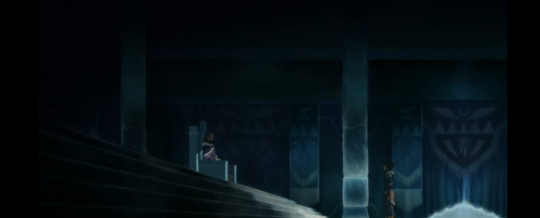
(Look at this? This person is trustworthy right. The guy is sitting in a dark room, alone doing a bunch of nothing. IN THE DARK!)
Unalaq was another one that I did not like since the moment I saw it. He is by far the worst villain even more that Ozai's greatest megalomaniac style, worse yet, Ozai wanted his Nation to rule the world while Unalaq wants evil to dominate simply because he wants to. But I give him something, he was good to see that moment of “wanting approval” that Korra and exploits it in his favor.
**
When Korra discovers that his uncle was responsible for the unjust sentence of his father when Unalaq underwent an attempt of kidnapping and that he also was responsible for the banishment his father years ago. First of all I can not blame her for the violent way she approached the judge for the conversation because I think it would do the same. (Dont mess with the people i love)
**
Something very interesting to note was that this season was where everyone was further away from each other. And the frozen scenery of the northern watertribe helped amplify this feeling. The soundtrack of this season is also incredible, all of the seasons are actually.
**
Another thing I liked was the interaction between the sons of Aang. It was a bit sad to know that despite being a great Avatar, Aang was a bit flawed as a parent. Paying more attention to his duty to the world than with his family. And clearly having a favorite son, Tenzin. I can understand why, but is sucks anyway
But I also think the character who was best explored this season was Tenzin. We can connect with his concerns. The burden of being responsible for the survival of the airbender culture, the fear of failure, and the quest to be a reflection of his father.
We know more about Bumi, and dude, the scene in ep.04 where he talks to his father's statue, apologizing for not being an airbender, and besides that , he did what he can to keep the world . And Kya is kind of a more lesbian cooler version of Katara in terms of personality.
**
One more “down” to this Book in the beginning was to make fun with the Bolin being clearly in an abusive relationship with Eska. This is not fun people, people die because of it.
Poor Mako in the first half, his only getting slapped by Korra . Later on I understand, but I dont agree with his position of delivering Korra's plans to get help for the southern tribe to Raiko. Episode 06 was focused on Mako, Bolin and Asami. We can see Asami, in a moment of weakness that I dont understand until today, kissing Mako. Bolin pursuing film career and Mako showing a certain ability as a detective. This I found cool because it gains another layer to the character , it is no longer just the romantic interest of Korra. It also had virtually the revelation of Varrick as a secondary villain for this arc of them
Bolin also has something nice, If in the first episode, he was shown was someone who only can fight with The Krew, later in book 2 he and we see that he is capable to fight alone for himself.
And Asami, this babe was her own “up and fall and up again” arc as CEO of her dad company. And she shows that she has what its need to take control of the business.
**
I really dont know what happened to the writers in this first half of book 02, way below the expected But Raava inspired them to make the wonder that is the second half of the season. And so I finish my analysis of the first half of book 02
**
Beginnings part 1 and 2 are my favorite episodes of the entire AVATAR series. Seriously, everything in these episodes is incredible, from the differentiated animation (Studio Mir is back baby!!!)to the soundtrack, and of course, the script.
In Beginnings we are introduced to the first avatar, Avatar Wan. And so, we are presented as the cycle began. From real, every time I see these two episodes I cry like a baby.
"Return to the beginning. Find Raava "
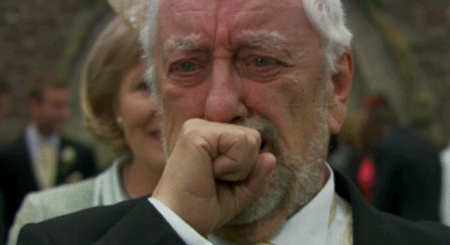
Lets talk about Wan, he was a young thief trying to survive, in a dangerous and authoritarian era of what might be considered the beginnings of the Fire Nation, a city that lay on the back of a Giant Turtle, protected them from the spirits -dominated forests.
I will not say much about these two episodes because even if you dont remember , go watch, seriously, it's incredible. And because if I start talking about them I will not finish.
In short. Wan receives the power of fire from the Giant Lion Turtle and go into the forest. Then he return home before entering the forest, and thus steals the fire power ,which was forbidden to use in the city.What is worth mentioning is that the bendinds there were not developed , dont expect martial arts movements.
Here ,even with power, Wan is merciful and selfless. He did not think only of himself, he did not exposed who participated in the rebellion with him and still spared the life of a guard. He is then banished to the forest and .... aaa did not say, I cant not speak of these episodes man
Anyway, after going through "trouble" on his first night out in the woods. He seeks the help of a spirit who simply says "it's not my problem", so Wan tries to fantasize as spirit to be able to enter the oasis of the same spirit that denied him help. Then he discovers that there are other LionTurtles, and consequently, other cities.
And in his journey, even with hunger he decides to release an animal, which turns his animal partner. And so, seeing the altruistic action of Wan, the same spirit that denied him help, helps him to escape the hunters. And so he decides to stay and learn from the spirits.
And so, Wan learns the dragon dance, protecting the oasis and his friends spirits. My baby Wan <3
Back in town, Wan's old friend decides to lead a group of people who believe that only with the power of fire, it is possible to live in the forests. Needless to say that shit happens right ?!
Then Wan decides to travel the world with his pet, Mula. The music in these parts is one of the most beautiful things I've ever seen, really.
Then Wan discovers Raava and Vaatu fighting and, unknowingly, helps Vaatu to escape. With the help of Raava ,who at first dont like the ideat of joining with Wan to fight Vaatu), Wan finds the other lions turtles and is given the other bendings.
Raava is light and peace. Literally, the good. Vaatu is evil.
However, Wan can only change elements, when the spirit of Raava passes through his body. Wan is an example of a good person, he literally made the biggest shit in the world but instead of running away, as many would do, he took responsibility and face it.
And it is on this journey that he begins to train heavy, the elements, and learn about the balance of the world.
"He can not destroy light any more than i cant destroy darkess. One can not exist without the other "_Raava
"Most humans think only about themselves" _Raava
Man, this is so true, worse, it's a direct truth. There is no metaphor here.
There we see humans using the power of fire to clear the forest, nothing new really. The same group as that friend of Wan. And so, these people attack anything (spirits) they see, not knowing whether it is good or bad, just by their own ignorance. What unfortunately happens in various parts of the world with minority groups that are attacked only by the ignorance of the aggressors.
In this 5-minute scene, we see all the power of ignorance and violence. Humans have invaded and destroyed the forest, and still set fire to any spirit that appears. In Brazil we have farmers doing exactly the same thing with the natives, with the moral help of the president. But we are not here to talk about the shit hole that is Brazil right now....
The stronger Vaatu gets, the smaller and weaker Raava gets.
(I'm almost crying because I'm writing while I'm watching this wonderful episode.)
It is then that Wan touch’s on the energy that comes out of one of the portals and this scene happens
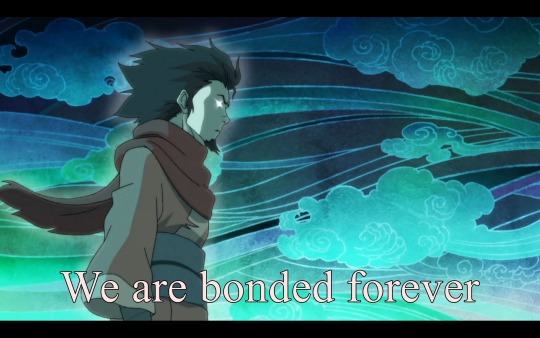
(This scene gives me so many chills. Its simple epic)
Now officially as Avatar, Wan and Raava succeed together defeating Vaatu, imprisoning for the next 10 thousand years. It is also Wan who makes the decision to close the portal, separating spirits and humans.
We then see the Lion Turtles talking that a new era has begun, and we will no longer be given the power of the elements to the people. Then shows Wan's narration as he separates two armies, because it seems that war is what a human being does best.
Then we think the episode ends there. With the message of the duty of the avatar and all but ...oh boy we are wrong . We see a much older Wan, mortally wounded in battle. Regretting that he had not fulfilled his duty to bring peace, that darkness still surrounds humanity, he did not have enough time.
"Do not worry, we will be together for all your lifetimes and we will never give up" _Raava
Soon after this talk of Raava, Wan dies and the cycle of avatars begins.
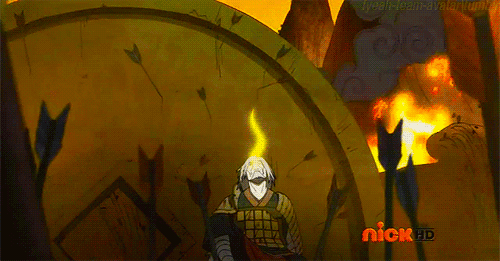
(im not crying... you are)
Something I think is very important to mention is that these two episodes, as well as this season of The Legend Of Korra, use something that I hate, that is the megalomaniac villain and the megalomaniac consequences. Only, especially in these two episodes of the Wan, we are not focused on this but on the learning of the character and all the wisdom of Raava(the hero).
Vaatu can be evil, he has to be evil because he is evil. Now, Unalaq? "Urrr I will release the spirit of darkness to become an evil avatar because I want, even if it destroys the world."
If Vaatu was the villain alone, trying to lead Korra to the dark side, I think it would have been better, or if Unalaq had been better worked for us to believe in his ambitions ... All the Korra villains have a very cool ideology be it equality, freedom or prosperity. Unalaq is only a classic religious fanatic, and a forgettable villain.
**
Moreover, the rest is just Korra and his friends preparing for Harmonic Convergence to beat Vaatu. And the end of the arc’s of Asami, Bolin and Mako.
Now, on this journey of Korra in the spirit world, when she misses Jinora and meets Iroh. Their interaction is wonderful.
I'll separate some quotes from Iroh to Korra, who at the moment is in the shape of a child.
Iroh says: "Even in material world you will find it, if you look for the light you can often find it. But if you look at the dark, heres what you will see "
Several things can be compared to this speech, but the first thing that came to mind was depression and its power to catastrophize everything. As depressive girl, I think I have the property to speak at least of my experience with it.
As depressive, I often see things on the more negative side and thus, "I search for darkness" and so, it is only her that I see. And as much as the search for light is arduous and tiresome, it compensates. It's a daily struggle. Even in the worst of times, look for the light in the dark and you'll be fine. Even if the path is dark and scary, we all have light and we can all walk that path, whether alone or with help.
And Iroh was also right in another speech, helping others is one of the best things you can do. I can not describe the good feeling that takes care of you when you help someone. I think if we all did that, the world would not be in such a mess.
**
Now let's talk about the shocking and sad scene of the loss of connections.
Honestly I think it's something that can be reversed, and if I did it in a fanfic the creators can do in HQ u.u
About the fanfic, ~propaganda moment here~, I swear that I will continue translate it a and post at least once a month on Wattpad with the link here on Tumblr.Who was interested, here is the link of the chapters already translated. I still do not consider myself fluent in English, so I accept any corrections.
Link for the chapters in English: https://www.wattpad.com/myworks/117030440-the-legend-of-korra-book-5-legacy
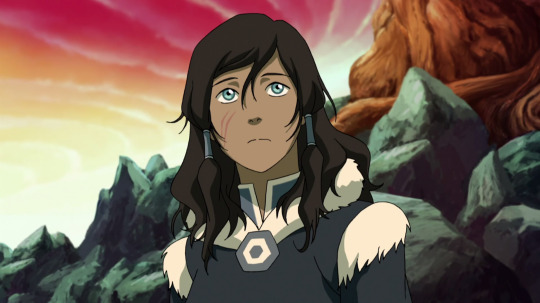
(This is just to say how much i love Korra with loose and messy hair, my god how I find it sexy. And for you guys to see this gorgeus image and forgive me for the “propaganda time”)
Returning...
Anyway, at first, I found it very heavy and unnecessary but after analyzing the series as a whole and not just Book 2, I think I understood.
Korra is the avatar in a world practically totally different from the world of Aang and the previous avatars. A world where technology grows every day, a world each more similar to ours. That is, a new era. And this new age, perhaps it did not need other avatars.
Dont slap me please. But like, for example, what am I going to ask a 19th-century person how she communicated, if we have the cell phone today? Things have changed, the experiences and how to deal with the things too. Perhaps Avatar Kyoshi does not have adequate advice for the Avatar in an increasingly political and complicated world.
The breaking of the cycle was literally the end of an era of Avatars, the avatars that will come after Korra, in theory, will be more apt to deal with these problems so similar to what we experience.
But yes, I wanted her to somehow reconnect.
As you can see, although I love reading philosophical, political, social, historical, and psychological things, I do not quote any specific author in my interpretations, but I certainly use the knowledge I learned in what I write. "Lara, why dont you quote this guys here?" Cause my memory is terrible in memorising words, which means that I would have to reread, to know who exactly said what, and my college dont let me have this much time
Another thing I forgot to mention, the Gifs are not mine, more talented people than I've done them, and I just picked it up from the internet. Ican tag you in the comments if you are the author of those
Although it is not the book that most focuses on psychological issues, it does so through philosophical questions of "Who I am" and "What is my duty in the world"
Overall, book 2 of The Legend Of Korra is the most nostalgic of all, in my opinion. And in my view, the theme that stands out is that of "Search for own identity".
We see this in Wan,Bolin, Korra, Tenzin, and Jinora in a more prominent way.
Wan on his quest for Avatar's identity, even if it is unconscious. Korra for the exact opposite, her quest is for herself. Who is Korra? And would Korra be limited to just been The Avatar?
Who is Tenzin? He finally detaches himself from his father's image. As he says in the fog of the lost souls: "Im not a refletion of my father. Im Tenzin " Bolin who discovers his is not just a sidekick to his brother, he is more than that
And Jinora discovering and embracing without question her full potential with the spiritual side.
And besides, i hate it the all giant final fight. I simple dont like it.
#the legend of korra#avatar korra#team avatar#Asami Sato#tenzin#mako#bolin#avatar#korrasami#raava#avatar wan
5 notes
·
View notes
Video
Elise Simard is an animation director and homemade special effects expert with a style all her own. In the tradition of the avant-garde, her films don’t tell a single linear story; rather, they evoke the feelings of many stories, happening all at once, and all around us. Soon we’ll be able to experience her vision literally all around us, as she ventures into VR filmmaking. I hope you appreciate “Opening Hours” above, and her other films—“Breakfast” is the most introspective 2 minutes you’ll have all week. Elise has a wonderful ability to see the artistry in the ordinary, a knack that we can all aspire to. And beyond her talents, she’s a great person. Enjoy!
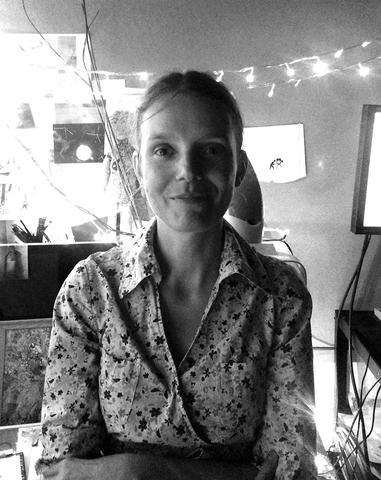
What can you tell us about ‘Opening Hours’?
It’s inspired by Jarry Park in Montreal; all the little lives that live and visit there. The park is big enough for many different energies to co-exist. It holds one of my favorite swimming pools in Montreal—I was inspired to explore what it’d be like if the pool had an occult, mysterious power. The goal was to open these different pockets of atmospheres, bringing people from one place to another without a traditional story.
Where did you study animation?
I went to Concordia University in Montreal to get a Bachelor’s of Fine Arts. I focused on design for two years, but fell in love with film animation, and began taking as many classes in it as I could. I was drawn into the animation program particularly because we were encouraged to be experimental. My first student film was even in 16mm!
Vintage! Why do you think animation was your calling?
I’ve always seen things from a cinematic angle, like viewing the world in shots and scenes. I’m excited by little things that inspire stories in me. At first, I was the atypical animation student in my class - I didn’t draw! It was only once I entered the program that I learned how to do so.
Whoa! So what'd you use to animate, before you had sweet drawing skills?
I used lots of cut-outs and raw materials - I still do! My first films, I drew on or around little pieces of tape and wood. I layered materials then photographed them, creating images just for the lens. And I played with how light draws out textures, which is still a focus in my work. With lighting, I can create a library of special effects, all self-generated.

What are some of your techniques?
There’s compositing, which lets me create my own computer graphics. And photographic compositing: exposing part of an image, covering it up, then exposing it again. Optical printing, as well. “Afloat at Dawn” demonstrates the effect of these techniques with lighting and texture. I shot on film for a long time before transitioning to digital.
What motivated that change from film to digital?
I grew curious about the potential of using new technologies to create. I actually just began a Master’s program for 3D animation a few months ago. I’m experimenting with VR especially. I’m still learning the basics, playing with the software and cameras.
That’s awesome. What do you imagine doing with VR?
I’m exploring its potential to create textures and luminous effects. I’m very excited about where it might go! I’m attracted to texture as a tool for storytelling, to evoke different emotional states. It’s difficult for me to describe exactly what I’m going for with VR… especially as I don’t yet know myself! It’s a new challenge.
Let’s talk motifs in your films, namely one: bears. What draws you to them?
Hmm, I’ve never really thought about that! They do show up quite a bit. I suppose because I prefer a subject barely moving at all, and very subtle movements. And I imagine bears as being very languid, so they inspire that kind of light motion for me. I suppose that’s why I’m drawn to them.
It’s funny, just yesterday I found the first thing that I ever animated in school: a bear walking! I’m doing tests on it in VR now, and it crackles, it’s so textured. It’s acetate, plastic, and the ink is 10 years old: chipped, yellowed, embedded with bits of dust. It’s a lovely discovery.
I love your ‘tiny musical’ “Breakfast”; what’s the story behind it?
I wrote the song in university. When I got the chance to spend two months at the Aberystwyth Arts Centre in Wales making a film, I had to choose a project very quickly. So I decided to record the song, with the lovely Clara Ortiz Marier singing. The film stemmed from the song. It was lightweight animation—everything I needed to create the film was in my suitcase.
vimeo
Where does sound usually come into your process?
Sound is very important in my work. I usually start with sound, then fine tune it to what I see in my head. Process-wise, I’m drawn to technical challenges and using formal elements, like sound, to evoke feelings and moods. I try to be as intuitive as possible in the way that I sculpt story.
Your work is avant-garde; what are your thoughts on narratives?
I’m so bored when I’m locked into a narrative! I use it as a starting point. For example, “Beautiful Like Elsewhere” is a scifi film, written with a clear narrative. But in creating the film, I backed up—I wanted to evoke a sense that you are viewing this story from another dimension. A more lyrical, visceral experience. Part of that is editing from the gut, rather than editing to a script.
How did your fascination with lighting come about?
As a child I played with mirrors a lot. I loved seeing how light reflected off of them, and how it changed when I altered the angle or amount. I would sit with mirrors in dark closets, experimenting. My Grandma had crystals - a whole basket of them - and I’d shine light through them to reflect on the walls. I suppose it makes sense that I’ve become an artist now! Although for the longest time, I was considering paths deemed more ‘practical’.
Was your family skeptical when you chose to study art?
My mother actually told me to do it. I didn’t care for what I was pursuing, and one day she said to me, “You know, art is what you love to do. Not everything needs to be hard. Why don’t you study it?” I’m lucky; my family was always encouraging.
Do you have a favorite among your films?
My latest film is always my favorite. So right now, it’s “Beautiful Like Elsewhere”.
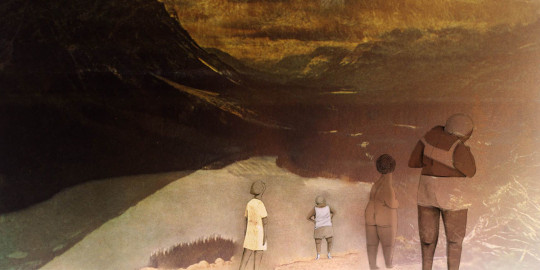
As part of the NFB, you collaborate with other filmmakers often. How is that experience?
Yes, I’ve worked for other artists a lot, and I’ve been very fortunate—everyone that I’ve worked with has been open to my ideas and creations. And they’ve opened up their processes to me. I’ve learned from everyone with whom I’ve collaborated.
Who are your biggest inspirations?
Lately, I’ve been inspired by the book Thought-Forms by Annie Besant and C.W. Leadbeater; it was created at the turn of the 20th century, and inspired the making of this magical bum. I’m very interested in transforming sex into lyrical and immersive forms right now, and this is part of a 3D experiment I’m currently undertaking.
I deeply admire Agnes Varda; her warmth, presence, and audacity are so inspiring. Even more so now that I am entering this new and wide open field of VR and emerging tech. There are qualities of her work that I’d love to see translated into VR. I’m not sure how it all relates yet, but I’m keeping an open mind.
Thank you for sharing your work with me Elise! Best of luck on all of your projects. I can’t wait to see where your VR ventures take you, and the medium as a whole. It’s good to know there are artists ensuring that it won’t just be “a toy” after all!
- Cooper
#The Frederator Interview#Elise Simard#NFB#Canadian animation#independent animation#Agnes Varda#Opening Hours#Breakfast#Afloat at Dawn#Frederator Studios#VR#Interview#artists#artists on tumblr#animation#avantgarde#experimental#Concordia University#fine arts
42 notes
·
View notes
Text
Empathy vs. the Machines
We recently welcomed two experts to Pier 17 for an informal conversation about the implications of new technology on ethics and empathy: Dr. Jodi Halpern, MD, PhD, is the UC Berkeley Professor of Bioethics and Medical Humanities, and Jonathon Keats is the principal artist behind Mental Work, whom The Atlantic has called a “multimedia philosopher-prophet.” Together, they explored how empathy can broaden the conversation around the impacts of tech and science — part of our SciComm Studio series inspired by the Mental Work showroom, and our continuing work exploring the emergent future of intelligent machines. We’ve condensed that conversation into key highlights below. On Philosophy Keats: I’ve chosen the job title ‘experimental philosopher’ because I don’t know exactly what it means. I decided to study philosophy because I wanted to do what I imagined philosophy to be as a child — going around being a pest. When I learned that isn’t really what academic philosophy is about, I chose to do philosophy on my own terms. I wanted to have conversations that weren’t limited to five other people with the same specialization, and I wanted to ask open-ended questions. The one mechanism I smuggled out of academia is the thought experiment. Essentially, it’s a way to coerce your opponent into agreeing with you by luring them into an absurd position. The coercion didn’t make much sense in my case, because coercion isn’t exactly open-ended, so I decided to take ‘thought experiment’ literally. I decided to see if I could undertake experiments out in the world, where I didn’t have a conclusion in mind. Instead the idea was to create absurdist alternate realities that people could experience together, in which everyone would be sufficiently disoriented to reconsider their opinions. Every project I’ve done has, in one way or another, engaged that methodology. ‘Experimental philosopher’ is a very old job title actually, dating back many centuries to before the advent of professional philosophy. I’m motivated by curiosity, in ways that don’t allow me to focus on a single subject, but to mix them in irresponsible and mutually enlightening ways. Halpern: I think we’re incredibly aligned! I also came to philosophy — I’m a psychiatrist, and studied philosophy of mind. My whole life has been about studying empathy. I was really shocked, in medical school, at how doctors were detached from the feelings of their patients. I became very interested in detachment, and took on every skill I could to attack the idea that you had to be detached. I studied the role of emotions in the beliefs we hold, and how to understand each other person’s distinct world and developed a model of engaged curiosity. Philosophy & Technology Halpern: Before modern science, before Descartes and the earliest sketches of the modern scientific method, in ancient philosophy, science and philosophy were sort of the same thing. Regarding our topic, both asked how one person could understand another person’s mind. Both took engaged curiosity to be central. In Aristotle, there’s this parable of a man staring at the stars and being so absorbed that he fell into a well. His curiosity was a motivation in and of itself. Today, research often has to be so immediately practical — to get grants and so on — that we lose touch with what science originally was. Keats: To me, science has become much more operational. It seems that science can benefit from considering why we’re undertaking the investigations that we are, and one way we can do so is by exploring alternatives — positing possible worlds. And what I say about science is also applicable to technology. Mental Work, specifically, is about exploring what might happen if we were to become cyborg. We’ve already allowed machines into our lives in so many ways without much thought; perhaps by taking a leap into the future and imagining how the future might manifest, we might be able to ask what kinds of technology we might want. Defining Empathy Halpern: In the clinical context, empathy is about certain moments of genuinely therapeutic interactions. Traditionally, it’s about being “understood.” I’m a bit critical of too narrow a definition of understanding, but there’s something transformational about being understood in a richer sense. What’s therapeutic about it — so far, this is my view — depends upon one person experiencing and internalizing another’s engaged curiosity. There are limits. Doctors always say “I know how you feel,” and that’s a bad thing to say because you don’t really know how other people feel. Each person is a world unto themselves. You can’t get all of the particulars of their individual experience. Keats: For me, empathy is related to theory of mind: The ability to appreciate that you can’t know what someone else is experiencing, and that what you are experiencing may not be identical to what someone else is experiencing. This is one of the great political challenges of our time. We seem to be losing whatever empathy we may once have had, and what’s coming into the world in place of empathy is xenophobia — an inability to appreciate how someone else might think, an inability to value what you can’t know. I’m investigating these questions in a new project called Intergalactic Omniphonics. Half a millennium ago, there was a Copernican revolution in the sciences that not only changed astronomy, but also taught us that we can run an experiment on Earth that can tell us about the entire universe. More generally, Copernicanism teaches us that there’s nothing special about where we are in space or time. But there had never been an equivalent revolution in culture. By ‘Copernican’, I’m referring to the act of decentering — where you don’t see yourself, your tribe, or your nation as the center of everything. To explore that idea, I’m making musical instruments that are potentially accessible to anyone in the universe — including aliens from other galaxies — and challenging our assumptions of what music is: the sensory, cognitive, and experiential assumptions we make as humans. What if you don’t have ears? What if we use gamma rays instead of sound? I’ve even invented a cello that modulates gravitational waves. Bridging divides is not about saying “I know how you feel,” but having an experience together. That’s the essence of empathy. Art & Philosophy Keats: I believe that philosophy and science — like most every discipline — have moved toward greater and greater specialization. That’s completely understandable and legitimate at one level: as you build knowledge, you get to a stage where any given individual isn’t going to be versed in all of it. The arts are the exception to this rule. Everything and anything can be art now. That can be detrimental, but also opens up enormous potential to explore any topic using any methodology. Art is a space that facilitates philosophy as philosophy needs to be done. The freedom given by the art world needs to be taken as a challenge to pursue curiosity in the most encompassing and inviting ways possible. Empathy vs. the Machines Halpern: We ask, can we empathize with machines, and can machines empathize with us? We can empathize with machines, yes. We can make a very simple stick figure that evokes empathy. There’s no question. But can they have empathy for us? I have two hours on YouTube on this question. Right now, we obviously don’t have AI, but in principle? I don’t rule it out. But the real question for me isn’t whether we can create therapeutic relationships with machines, but should we? AI psychotherapy, for example. The problem for me is if this machine-human interaction replaces transformational empathy between two human beings. There should be a co-vulnerability, a co-mortality. So now some people have heard my work and want to create a mortal AI! Keats: Can a machine be empathetic? Can an animal or any other organism? I think it relates to the issue of humans treating humans as special and privileged. Being open to the possibility of an empathetic machine can induce us to question our own self-importance. There’s also the matter of how machines can make people more empathetic to other people — machines as a mediators of relationships. In the past, I’ve often been inspired by philosophical instruments, mechanisms that can be used to confront complex ideas through interaction with a physical object. For instance, philosophical instruments were an inspiration for Mental Work. Ideally, what happens with a philosophical instrument is that people confront ideas together, leading to a relationship or conversation that can be generative of empathy through co-exploration of who we are. Technology & Empathy Halpern: Descartes, from the beginning, was really a technologist. There was this idea that the purpose of engineering science was to design solutions to problems. When it comes to ethics, experts often focus too much on utilitarian questions, which are focused on outcomes–the catastrophic, unintended consequences. But for most people, ethics is more about our rights and duties to each other. Not just the outcome, but how we treat each other along the way. We don’t have to wait 5 years to see what happens. We can look at how it changes the way we treat each other right now. A professor at Yale spoke to me, and said, you know, you could foresee this recent use of social media to silo people politically— the companies said the internet would make the world more socially connected, and this would bring people together and end tribalism. Well, the same was said about the telegraph and the radio. Each time we thought we finally had a tool to unite people across differences, but we didn’t ask the right questions. Both technologies actually worsened tribalism, helping stir up conflicts that lead to world wars. We keep making the same mistakes, imbuing technology with magical powers to change how we treat each other. Keats: Mental Work was inspired in part by my wariness about the Industrial Revolution, and how society took up industrialization without thinking through the consequences. Arguably we’re now on the verge of a Cognitive Revolution. In the Industrial Revolution, the machine could do what the body could do, but more powerfully and quickly. We’re approaching an era where the human mind may likewise be challenged by AI and rising computational power. So how do we navigate change and prepare for the future in a way that is as informed as possible? I want to make the connection between the Industrial Revolution and the Cognitive Revolution explicit with Mental Work. We can avoid the worst and most obvious mistakes by fabricating possible worlds to experience together — foundations for reflecting on where we’re going before we get there. We can negotiate the future we want, rather than settling on the one arrived at by default. Keep up to date with ideas, insights and events by signing up for our monthly newsletter. --- Mental Work installation photo by Astra Brinkmann for swissnex San Francisco. https://nextrends.swissnexsanfrancisco.org/empathy-vs-the-machines/ (Source of the original content)
0 notes
Text
Top 10 Books to Read Before You Die

If you have only six hours left before you die, can you say you have fully lived that life yours? You must be looking for a really good book suggestion or just contemplating on life – maybe looking for something to read to make you brood even more. Whatever your reasons are, I am here to share about books to brood over life. Kidding. These books were a great source of inspiration instead of depression. Personally, reading novels is like living another life from the perspective of the characters. Why live a single life if I can experience hundreds more, right? So, if you want to feel a rush to flip through pages, heartaches, adrenaline, and inspiration plus visit different lives all over the world, I invite you to read these beautiful literary masterpieces that I treasure so much. 10. Five People You Meet in Heaven by Mitch Albom What a way to start the list with a book about a dying man.
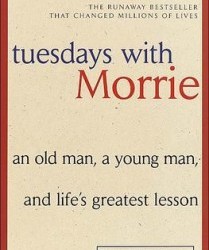
Tuesdays with Morrie This beautiful novel is about an 83-year old man named Eddie working at Ruby Pier, an amusement park. He was living his normal routinely life as a maintenance personnel when an equipment called Freddy’s Free Fall malfunctioned resulting in his death. He was trying to save a little girl from getting crushed and got in the accident instead. After his death, he found himself in heaven where he gets to revisit his whole life, from his happiest to his most regretted decisions. This book will give a "feels" trip about friends, family, love, regret, and forgiveness. 9. Animal Farm by George Orwell This is one of those stories that the more you research, the more you understand the meaning and depth of the literature. The story started with a meeting called by the prize pig, Major, after having a strange dream. Major sensed that his death was near. In that meeting, he shared his wisdom that no animal is truly free and that their life and meaning revolved around slavery. Major urges everyone to rebel against the owner of the Manor Farm, Mr. Jones and have a life of abundance that they deserve. Three days later, Major died but the wisdom, the spirit of Animalism, lived on through the animals as they start planning for their secret rebellion. Initially, the rebellion was a success. For a while, the animals had their utopia and renamed the Manor Farm to Animal Farm. However, Mr. Jones refused to give up and gathered other humans to take the farm back. More problems arise when one of the supervisors, Napoleon, was filled with greed and made himself to be the sole leader. This novel is an allegory to describe the early years of the Soviet Union. Animal Farm contains George Orwell’s thoughts about the Russian revolution of 1917, totalitarianism and socialism. To further understand the novel, analysis and summary are available online. An essay called “Why I Write” also explains what prompted the author to write this novel. 8. Fireflies in December by Jennifer Erin Valent Racism is still a sensitive issue nowadays despite the progress we’ve made through the years. This book will remind you how extreme it was in the 1930s from the perspective of a 13-year-old girl, Jessilyn Lassiter. Initially, I thought this was just about her experiences as a tomboy slowly turning into a woman. However, that summer when she thought she killed a man and was deserted by everyone for living together with her colored best friend Gemma, I realized that the story is more than just that. 7. Time Traveler’s Wife by Audrey Niffenegger
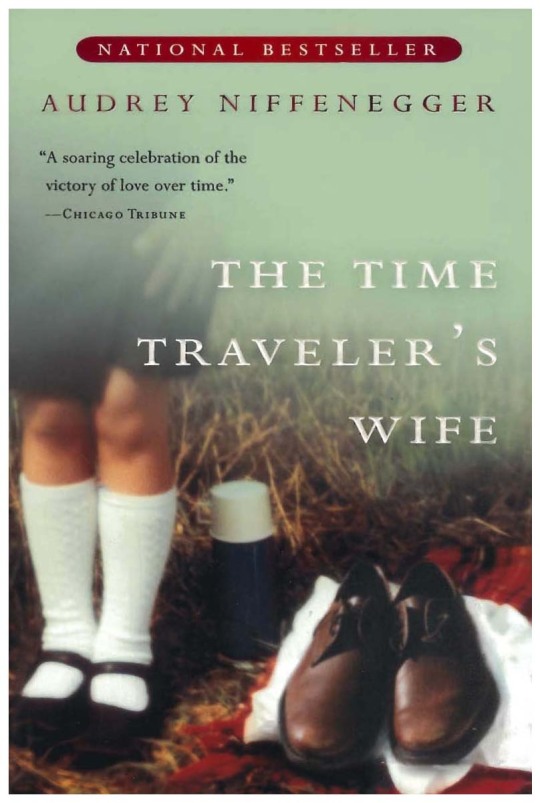
Time Traveler's Wife This is definitely one very unique story of falling in love and getting married. Henry is a time traveler that cannot control his traveling ‘disorder’. Clare, his beautiful wife, met the 36-year-old Henry when she was still six years old. She often helps him with food and clothes whenever he stumbles around her family's property naked because of his 'condition'. The two then formed a strong connection through the years of ‘visiting’ until it was Henry’s turn to meet his wife for the first time. They met in a library when Clare was a 20-year-old art student and Henry was a 28-year-old librarian. Clare tried to explain that she met him when she was still a little girl. Despite being surprised that Clare knew about his illness and of the circumstances, Henry still agreed to go to dinner with her as he finds himself extremely attracted to Clare. Their love story immediately starts up a storm after that first meeting. Happiness, struggles, heartbreaks, and loneliness followed as they try to make their marriage work. The uncertainty of Henry’s whereabouts and safety cause so much strain in their relationship. (Strain is quite an understatement.) I have conflicting emotions for this story of love and family. However, it made me appreciate that experiencing time in a chronological order is something to be grateful for. 6. Veronika Decides to Die by Paulo Coelho Well, it is exactly what the title reads. The story is about Veronika who lived a perfectly normal life. She had a good job, a nice-looking face, and great parents. But one day, she decided to die through an overdose of sleeping pills. As she waited for her death, she read an article that jokingly asked, “Where is Slovenia?” Having not much to do but wait for her death, she found it humorous to write a reply to the magazine and imagine the controversy that may arise as that will serve as her suicide note. Instead of discovering afterlife, she woke up in a mental hospital called Villete. She then learned that she was in a coma and will die after a few days because of an extremely damaged heart resulting from the overdose. Counting her days, she then experiences life more fully in the institution as she has no expectations to meet and can freely express herself. She felt the changes in her as she loses her indifference and started to feel fear of dying. The book discusses the concept of insanity and questions our perception of reality. The literature was created partially based on the author’s personal experiences in mental institutions. 5. The Secrets of the Immortal Nicholas Flamel by Michael Scott The thing is, I’m a huge fan of the idea of Alchemy and Immortality.
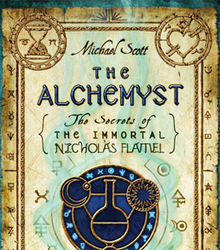
The Alchemyst: The Secrets of The Immortal Nicholas Flamel The story started right off with a battle in a bookstore where Josh Newman smelled peppermint and rotten eggs. Yeah, talk about a weird day at work, right? Read on and the story gets interesting as Josh got caught up with his boss’, Mr. Nick Fleming's, magical battle with Mr. John Dee over an important book. His twin sister, Sophie, and Mr. Nick’s wife, Mrs. Perry run to the chaos and tried to help. However, Mr. Dee ended up taking that precious book and captured Mrs. Perry as well. Turns out, that stolen book was what kept Mr. Nick or Nicholas Flamel and his wife, Perenelle, immortal. Nicholas Flamel was actually the greatest "alchemyst" there is and can use magic to make the elixir of life in the stolen book called Codex. The twins and Nicholas needed to get the Codex and Perenelle back before the end of the month or the couple will age and die. To make the matters worse, with the use of the Codex, Dee plans to summon the Dark Elders, the beings that ruled the planet before the era of the human beings, to destroy the world. If you are looking for an adventure and magic, you may fall in love with this series. 4. Lovely Bones by Alice Sebold I’ve read this book when I was exactly the age of the main character, Susie. So, imagine how my skin crawled as a fourteen-year-old girl reading very descriptively how she was raped and murdered. This story was narrated by Susie herself as she was wandering in her imperfect heaven. She watched over her family and observed how her case was slowly being investigated by a detective named Len Fenerman. I could still remember the disgust, fear, anger, and despair that I felt especially when her parents slowly discovered their daughter’s death through an elbow. Yes, a piece of elbow found by a dog and lots of blood that was identified to be their daughter’s. 3. Man’s Search for Meaning by Viktor E. Frankl A Psychiatrist’s job is to take care of their patients’ mental health and sanity but what if the psychiatrist himself was subjected to torture? This is a true story written by Viktor E. Frankl about his personal experiences being a prisoner in a Nazi concentration camp. Mr. Frankl had the ability to flee Austria and pursue his child brain logotheraphy in Vienna during the Second World War. However, he chose to stay and do whatever he could to protect his parents. A remarkable line that I’ve read from this book was: “He who has a why to live can bear with almost any how”. This book was filled with heartbreaking experiences of injustice, suffering, and survival. He asked, “When you absolutely have nothing to lose except for your naked life, what could make you keep going?” If you struggle with depression or just someone that has always questioned life, maybe you could get some inspiration as he tries to answer that latter question in this book. 2. Every Day by David Levithan
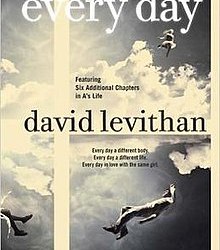
Every Day This story is literally living hundreds of lives in a single lifetime gone out of control. A is a unique individual as he lives through life transferring from one body to another every day. This might sound cool but it’s a condition A cannot control and as far as “he” knew, “he” was the only one born with it. (A doesn’t have a gender as it depends on the body he was borrowing so let’s just call A a "he" in this paragraph.) “He” was fed up to change and for years, "he" just conformed to act however the person was borrowing acted. That is until “he” fell in love with Rhiannon. A tried to defy this unique hindrance and struggled to win Rhiannon’s affection. Along with the messed up circumstances and romance, I also enjoyed every life A had experienced. "His" insights as someone who never actually belonged to any skin color, gender, body type, religion or culture felt so refreshing. I'm quite excited to watch the movie adaptation of Every Day too! 1. Tuesdays with Morrie By Mitch Albom “Do I wither up and disappear or do I make the best of my time left?” That was the question presented early on in this novel worth reading. This is about Mitch and his favorite professor, Morrie. The old professor had a terminal illness called Amyotrophic lateral sclerosis or also known as ALS. This is a type of illness that slowly gives the patient a slow yet certain death. It slowly melts your nerves and robs your ability to move. Despite the illness, the professor decided to spend his last days teaching. The subject was called the meaning of life and was taught through life experiences. Each class would take place once a week at the professor’s house. No exams were given although a paper that contained all that was learned is expected. This paper was presented in this book. For the professor’s last class, he had only one student and that was Mitch. BONUS: The Giver by Lois Lowry This book takes a systematic and control freak society to a whole new level. The novel is one of the shortest that I’ve read but it’s definitely one of those that left so much impact. Boy, I was staring at nothingness for a long time after I’ve read the book. It made me love and appreciate my ability to perceive colors more than anything while feeling so dead inside. Okay, I should tell a little bit about the story. It was told through the point of view of Jonas, an eleven-year-old that’s living in this futuristic dystopian community that has no pain, suffering, hate or strong emotions. Everyone is so kind and polite. Every citizen has a place and job that’s rightly decided by the council of elders for them. It is basically because the society has chosen ‘sameness’ to save everyone from making wrong decisions. Everything is the same from the age on when you are allowed get a bicycle to the method on how to apply for a ‘family unit’ and being ‘assigned’ with a child. Heck, to have a spouse, you need to apply for it and after thorough studying and consideration of personalities, intelligence, and compatibility, you might be assigned to one. Children are born out of birthmothers who themselves cannot ever see. Babies will then be cared for by the nurturers and will be assigned a name from a previously selected list - that is, if they are found to be ‘unfaulty’. They then are assigned to a family which has applied to get one. When the citizens grow old, they will be sent to the House of The Old and be ‘released’ after living their time. Not only the old can be ‘released’ from this community – faulty new children, two-time violators of the law; a citizen may even apply for one and be granted right away. This novel is just simply disturbing. Collecting my emotions after finishing the book was as hard as writing my thesis. I am clearly exaggerating but this book definitely left me broken. I presented a great selection, right? If not, then it’s okay. Different people have different tastes and thought processes. Plus, I cannot say as well that I’ve read every book there is. There are so many books out there in different languages. Heck, some great books might not be even published yet and just lying in some people’s computer right now. How I wish I can live my life reading even half of the available literature. Nonetheless, those listed are my favorites. Even though I read to experience another life with different circumstances, I could say that through reading them, it made me think about my own. I realize my privileges of living in this country during this progressive century. Reading started as an enjoyment and escape from reality but when properly reflected upon, it surely guided me to make better realizations on how to deal with life and other people. Everybody has a story we may never know about. Each has conflicting opinions and judgment. However, at the end of the day, we are all just humans trying to get through life. If you enjoyed my list, please comment down below and let’s discuss our favorites. However, if you disagree, please suggest to me your top ten books so that I can read and have a little chat about them with you guys. Also, if you have noticed, there were 11 books instead of ten. Consider it as a random bonus you got on a random day. You're welcome. Want more book related articles? Suggest them down below and we'll try to make it for you. Read the full article
0 notes